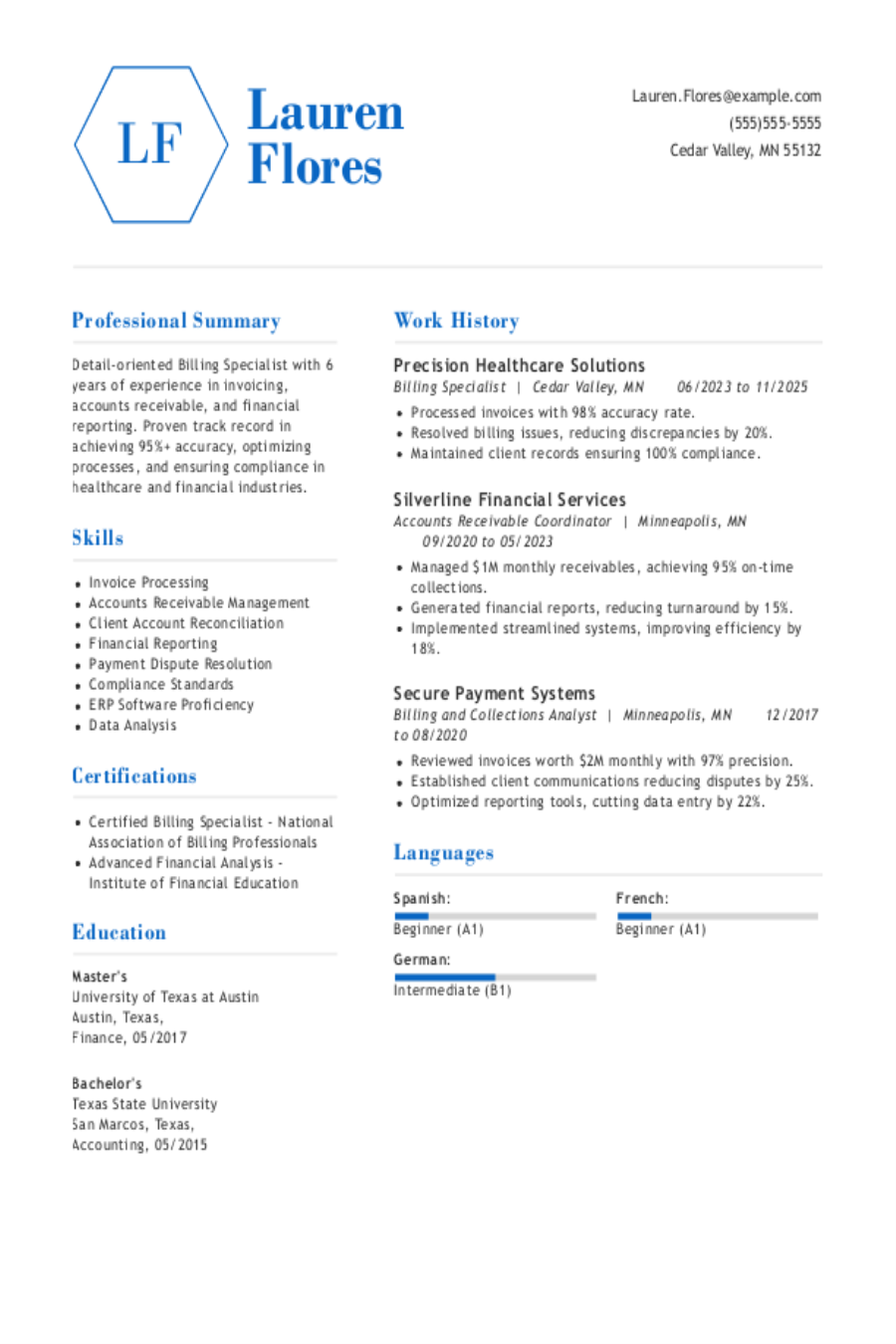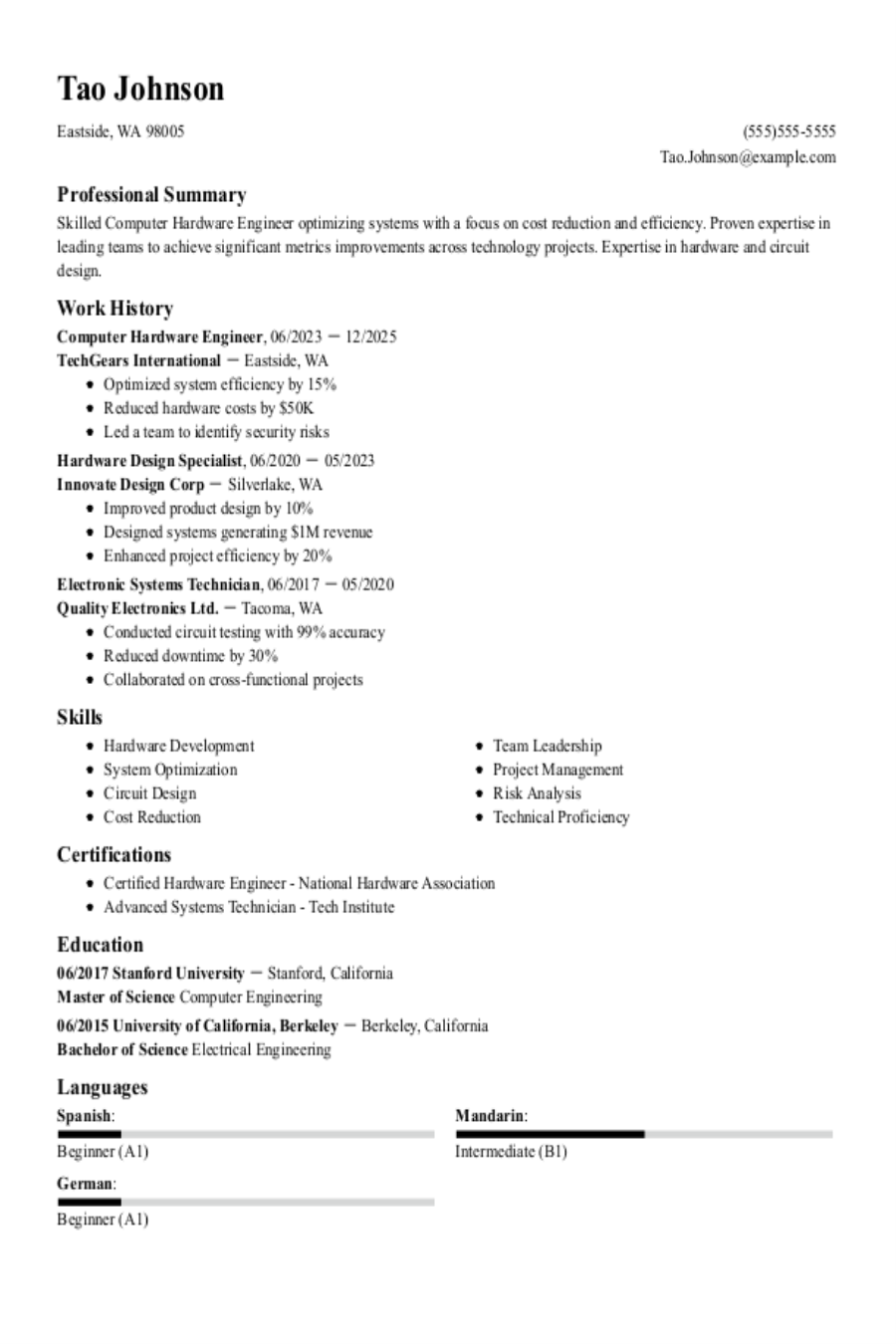Popular Lab Technician Resume Examples
Entry-level lab technician resume
A well-crafted entry-level resume for a lab technician should highlight relevant education, laboratory skills, certifications, and any internships or volunteer experiences to showcase competence and readiness for the role.
Focuses on goals: The lab technician applicant demonstrates a proactive approach to professional development, evidenced by significant contributions in their previous roles that improved laboratory efficiency and streamlined processes.
Showcases education: This resume opens with an education section that highlights the candidate's scientific knowledge and academic achievements.
Mid-career lab technician resume
A mid-career lab technician resume should emphasize a strong combination of technical expertise, practical experience, and ongoing professional development to effectively demonstrate growth and value in the field.
Employs active language: Using action verbs such as "conducted," "calibrated," and "implemented" conveys initiative and measurable results, showcasing a proactive approach to lab efficiency and accuracy.
Encourages quick scanning: A well-structured resume improves the visibility of qualifications, making it straightforward for employers to identify key skills and achievements that demonstrate the job seeker's expertise.
Experienced lab technician resume
An experienced lab technician resume should emphasize relevant skills, certifications, and key achievements to highlight the applicant’s growth and expertise in the field.
Quantifies achievements: Quantifiable achievements provide clarity and impact by showcasing specific results. For example, indicating a reduction in testing errors by 30% or managing over 150 samples monthly makes accomplishments tangible and easily recognizable for recruiters.
Follows traditional format: The chronological resume format effectively presents the job seeker's extensive experience, enabling clear visibility of career progression through a structured timeline that highlights key roles and achievements in laboratory settings.
No experience lab technician resume
A resume for an applicant with no experience should highlight relevant coursework, technical skills, and any laboratory-related volunteer work to showcase the job seeker's preparedness for the position.
Overcomes lack of work history: Emphasizing laboratory skills and volunteer experience showcases the job seeker's capability to excel in a lab technician role, despite limited professional experience in the field.
Draws from diverse experiences: Including extracurricular activities and volunteer roles improves a resume by demonstrating practical skills and commitment, helping to bridge gaps in professional experience for aspiring lab technicians.
Lab Technician Resume Template
Kickstart your job application with this tailored lab technician resume template. Feel free to adapt it by adding your personal details and showcasing your unique skills.
Aiko Brown
Greenfield, IN 46148
(555)555-5555
Aiko.Brown@example.com
Professional Summary
Dedicated lab technician enhancing accuracy & efficiency. Proven track record in optimizing workflows. Expert in maintaining lab equipment and analyzing samples for precise results.
Work History
Laboratory Technician
Precision Labs - Greenfield, IN
January 2022 - September 2025
- Analyzed 450+ samples weekly for accuracy.
- Optimized workflows boosting productivity by 30%.
- Maintained lab equipment ensuring 95% uptime.
Clinical Lab Assistant
HealthQuest Diagnostics - Greenfield, IN
January 2017 - December 2021
- Doubled test efficiency with new batch protocols.
- Improved sample storage system by 40%.
- Trained 10+ interns in lab safety procedures.
Biotech Lab Associate
GeneTech Innovations - Indianapolis, IN
January 2016 - December 2016
- Conducted 200+ studies, enhancing data precision.
- Integrated new tech reducing error rate by 25%.
- Led team achieving projects 5 days early.
Skills
- Analytical Chemistry
- Lab Equipment Maintenance
- Sample Analysis
- Data Reporting
- Workflow Optimization
- Quality Control
- Laboratory Safety
- Biotechnological Procedures
Education
Master's Biotechnology
University of Illinois Urbana, IL
June 2015
Bachelor's Chemistry
University of Illinois Urbana, IL
June 2013
Certifications
- Certified Laboratory Technician - American Society for Clinical Pathology
- Biotechnology Specialist - Biotech Association
Languages
- Spanish - Beginner (A1)
- French - Intermediate (B1)
- German - Beginner (A1)
Must-Have Skills on a Lab Technician Resume
A strong skills section is important for showcasing your qualifications on a resume.
The following data highlights the most sought-after hard and soft skills for lab technicians based on Resume Now’s internal resume research.
When you’re ready to improve your resume, try our AI Resume Skills Generator. It recommends relevant skills tailored to your job title, allowing you to create a comprehensive and personalized skill profile.
Writing Your Lab Technician Resume
Having explored these effective resume samples, you are now prepared to dive into the art of crafting your own. We will take you through the essential steps on how to write a resume, addressing each section thoroughly along the way.
List your most relevant skills
An effective skills section in your lab technician resume should highlight specific laboratory techniques, equipment familiarity, and essential soft skills like teamwork and attention to detail. By incorporating keywords from the job listing, you signal to both human recruiters and applicant tracking systems that you are a well-suited job seeker for the position.
Using these keywords effectively demonstrates your alignment with the role's requirements, improves your visibility during initial screenings, and strengthens your appeal when hiring managers review your qualifications closely.
Example of skills on a lab technician resume
- Proficient in performing laboratory tests and analyses with precision
- Experienced in maintaining and calibrating lab equipment for optimal performance
- Strong communicator adept at collaborating with multidisciplinary teams
- Careful attention to detail ensuring accurate data recording and reporting
A strong skills section should highlight both hard and soft skills, showcasing an applicant's technical expertise alongside their ability to communicate and collaborate effectively. This balance demonstrates readiness for diverse laboratory challenges.
Highlight your work history
Your work experience section is important for your lab technician resume, allowing you to highlight not only your responsibilities but also your achievements in the lab. Focus on showcasing how you've applied your technical skills to achieve outcomes, using specific examples that demonstrate your value as an applicant.
When detailing each job entry, be sure to include key information such as your job title, the employer's name, and the dates of employment. This establishes professional credibility and allows employers to easily assess your background.
Example of a lab technician work experience entry
- Lab Technician
Health Innovations Inc. - San Diego, CA
June 2019 - Present - Conduct over 150 laboratory tests weekly, ensuring adherence to strict quality control protocols and achieving a 98% accuracy rate in test results
- Collaborate with physicians and healthcare staff to interpret test findings, improving patient care through timely communication and effective problem-solving
- Maintain laboratory equipment by performing regular calibrations and troubleshooting issues, decreasing downtime by 30% through proactive maintenance strategies
- Train new lab technicians on safety procedures, proper sample handling techniques, and data management software, improving onboarding efficiency by 25%
- Implement process improvements that reduced specimen processing time by 15%, contributing to a faster turnaround for patient diagnostics
Aim for clarity and impact in your resume bullet points. Use concise phrases that highlight specific skills or achievements, ensuring each point adds value without overwhelming the reader with excessive detail.
Include your education
The education section of your lab technician resume should be arranged in reverse-chronological order, starting with your most recent degree or certification. Include details such as the institution's name, degree obtained, and graduation year. If you have a bachelor's degree or higher, it is acceptable to omit your high school diploma or associate degree to keep the focus on more advanced qualifications.
For those currently pursuing a degree or who have incomplete education, list the highest level completed along with an expected graduation date. Including relevant coursework or academic achievements can also improve this section for recent graduates or current students.
Common certifications for a lab technician resume
- National Certified Lab Technician (NCLT) – American Society for Clinical Pathology (ASCP)
- Certified Medical Laboratory Technician (CMLT) – American Medical Technologists (AMT)
- Medical Laboratory Technician (MLT) – National Credentialing Agency for Laboratory Personnel (NCA)
- Clinical Laboratory Scientist (CLS) – American Society for Clinical Pathology (ASCP)
Showcase publications and research
As a lab technician, including a publications section on your resume can demonstrate your expertise and contributions to the scientific community. These credentials not only highlight your knowledge of laboratory practices but also illustrate your commitment to advancing research in your field. Including publications can significantly improve your professional credibility and set you apart from other applicants.
You should create a dedicated section when you have several significant works to display, allowing potential employers to assess your research contributions easily. If you have only one or two publications, integrating them into sections like education or relevant work experience may suffice. Ensure that you use the appropriate citation format for each entry, as this reflects attention to detail—an important trait in laboratory settings.
Example of a publications section
- Smith, J. & Brown, A. (2024). "Innovations in Clinical Laboratory Practices". Journal of Clinical Laboratory Science, 29(1), 45-60.
- Johnson, L. & Green, M. (2023). "Impact of Automation on Lab Efficiency". Lab Management Review, 15(2), 120-135.
- Research Team Member, National Health Institute (2022–2023). "Research Contribution to Pathogen Detection Project". Assisted in developing new testing protocols for infectious diseases.
- Chen, H., Johnson, A., et al. (2022). "Collaborative Study on Blood Sample Analysis Techniques". Clinical Chemistry Journal, 37(4), 201-220.
Sum up your resume with an introduction
Creating a strong profile section in your lab technician resume is essential for making a positive first impression on potential employers. This profile introduces your qualifications and sets the tone for the rest of your resume, allowing hiring managers to quickly understand your background and expertise.
If you have substantial experience in the field, using a professional summary allows you to showcase your key accomplishments and skills right at the top, making it easier for recruiters to gauge your fit for the position. If you have less experience, write a resume objective that highlights your career growth.
Professional summary example
Careful lab technician with over 5 years of experience in clinical and research laboratories. Demonstrated success in conducting complex tests, ensuring quality control, and maintaining accurate records. Proficient in using advanced laboratory equipment and techniques, while adhering to strict safety protocols and regulatory standards.
Resume objective example
Enthusiastic lab technician eager to apply hands-on skills in sample analysis and equipment maintenance to support innovative research initiatives. Committed to improving laboratory efficiency and accuracy while ensuring compliance with safety protocols for optimal results.
When crafting your resume profile as a lab technician, seize the chance to showcase relevant keywords from job descriptions. This section serves as your primary opportunity to align your skills with the specific needs of potential employers. By doing so, you improve the likelihood of passing through ATS systems and catching the attention of hiring managers.
Add unique sections to set you apart
Incorporating optional resume sections can help you highlight your unique qualifications as a lab technician. These sections allow you to present additional skills and experiences that set you apart from other applicants.
By including relevant hobbies or volunteer activities, you give potential employers insight into your personal values and work ethic. For instance, if you've volunteered in community health initiatives or engaged in science-related hobbies, it shows your commitment to the field. This not only reflects your passion but also illustrates how you actively develop skills that complement your professional expertise.
Three sections perfect for a lab technician resume
- Technical skills: Highlighting your technical skills showcases your hands-on abilities essential for a lab technician role. Include specific laboratory techniques, equipment skill, and any certifications that reinforce your expertise in this area.
- Quality control procedures: Detailing your experience with quality control illustrates your commitment to maintaining high standards in laboratory practices. Describe the protocols you've followed, any relevant experience with audits, and how you ensure accuracy in test results.
- Collaborative projects: Participating in collaborative projects emphasizes your teamwork skills and ability to contribute to successful outcomes. List interdisciplinary teams you've been part of, outlining your role and the impact of the project on lab operations or research objectives.
5 Resume Formatting Tips
- Choose a format that matches your career stage.
Choosing the right resume format is important for showcasing your qualifications. If you are an experienced lab technician, a chronological format effectively highlights your career progression.
However, if you're just starting out, consider using a functional format that emphasizes your skills and education instead of work history. - Pick a smart resume template.
Using a professional resume template is key to improving readability. A well-structured format allows your qualifications to shine through quickly. If you opt for a custom design, keep it straightforward and select fonts that are compatible with ATS systems to avoid any formatting issues.
- Select an appropriate font.
Choose a clear and professional font for your resume to improve readability. Fonts such as Arial, Helvetica, or Garamond are effective for both applicant tracking systems and hiring managers alike.
- Use consistent formatting.
Ensure your resume features uniform margins and is aligned to the left. This improves readability and presents a polished, professional look to potential employers.
- Keep your resume to one or two pages.
When crafting your resume, remember that resumes should be one page long unless you have substantial experience. Keep your content concise and focused to highlight the most important information effectively.
Tools for Your Job Search
Are you gearing up to apply for that lab technician role you've been interested in? Before you hit send on your application, consider leveraging our ATS Resume Checker. This essential tool gives you insights on how your resume will perform with the automated systems many laboratories use for initial screening.
Want to elevate your resume further? Our AI Resume Builder provides tailored recommendations specific to your lab experience, along with professional templates designed to make your technical skills and achievements stand out to hiring managers.
Frequently Asked Questions
Last Updated: September 30, 2025
Absolutely. A cover letter is important as it adds depth to your resume and creates valuable communication opportunities with potential employers. It allows you to express your enthusiasm for the lab technician role and demonstrate how your skills align with their needs. Remember to write a cover letter that highlights your unique qualifications.
For a quick and efficient solution, try our AI Cover Letter Generator. In just minutes, you can create a tailored cover letter that stands out. With plenty of cover letter template options available, you can easily find one that matches your resume perfectly, ensuring a professional presentation of your qualifications.
A resume is typically a concise document, spanning one to two pages, that summarizes your relevant work experience, skills, and education. In contrast, a CV (curriculum vitae) can extend several pages and provides in-depth information about your academic achievements, research contributions, publications, and professional experiences.
When applying for positions in academia or specialized fields such as science or law, you will likely need a CV. If you're unsure where to start, our online CV Maker is an excellent resource to help you create tailored CVs quickly and efficiently. Choose from various CV templates designed for different industries and career levels to craft the perfect document for your needs.
Selecting the right resume format is important and should align with your career level and unique strengths. Inexperienced job seekers often find success with a functional format, as it highlights their skills over limited experience. For those with more experience, a chronological format is ideal since it showcases a clear work history. Mid-level professionals might consider a combination format, which effectively balances both skills and experience to appeal to potential employers.
To make your lab technician resume stand out, select a modern, professional template and integrate essential keywords from the job description. This will showcase your qualifications and improve your appeal to employers.
An active LinkedIn profile is important for lab technicians seeking employment. It allows you to connect with industry professionals and effectively showcase your technical skills and achievements.
In your resume as a lab technician, briefly highlight your aspirations, like "Lab technician aiming to specialize in microbiology." In your cover letter, expand on these goals and express how specific roles can facilitate your growth. Focus on applying for positions that offer training or mentorship opportunities to help you advance in your career.
Was this information helpful? Let us know!
Leisha is a career industry editor dedicated to helping job seekers excel in their careers.
More resources

Half of American Workers Doubt Wages Will Ever Catch Up to the Cost of Living
Resume Now s wage stagnation report shows that American worker...

How to Write a CV: The Ultimate Guide
Here is a complete and comprehensive guide to writing a CV ev...

Billing Resume: Examples & Templates
As a billing professional you need a resume that captures the...

Interview-Winning Computer Software Resumes Examples and Tips
As a computer software professional your resume should showca...

Computer Hardware Resume: Examples & Templates
As a computer hardware professional you need a resume that sh...


